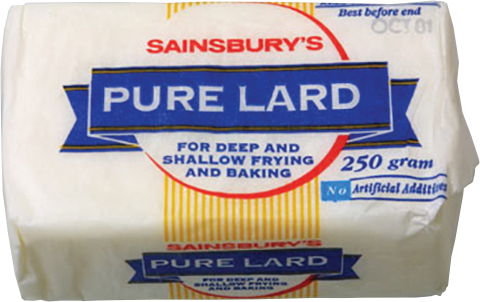It’s in again
 Cold weather. Hog-killing time. I’ve got great news for you.
Cold weather. Hog-killing time. I’ve got great news for you.
Lard is in again.
Yessir.
According to a “meta-analysis” published in the Annals of Internal Medicine, there was “just no evidence to support the notion that saturated fat increases the risk of heart disease.” Not only that, there is some evidence to indicate that too little saturated fat might hurt you.
And as you know, one of the best sources of saturated fat is lard.
I grew up with lard.
My grandmother bought it in buckets and fried everything fryable in it – from chicken to peach pies. When we cleaned out her kitchen after she died, the wall behind her stove was so caked with splattered lard that we had to scrape it off with a spatula.
Her daughter, my mother, followed in her footsteps, and during my childhood, lard was a staple in our house.
Then it disappeared, replaced by vegetable shortening, which was supposed to be healthier – less saturated fat or something like that.
I am not sure how much attention Mama paid to the health claims. Because of the prevalence of pork in her cooking and her habit of saving the drippings for future flavoring, our family continued to get our fair share of pig fat.
And chicken fat and beef fat, and so on and so on.
My father’s argument in favor of animal fat was simple and difficult to refute: “It tastes good.”
Now without getting into all the scientific debate over the relative benefits and dangers of polyunsaturated fats, mono-unsaturated fats, trans fats and such, let me simply say that this report makes a good case for the way Grandma, Mama, and most of the cooks of their generation fed their men.
The articles also confirm the old adage that “fat is flavor,” while giving us reason to ignore the advice of health food fanatics who tell us “if it tastes good, spit it out.”
Before you get all excited and rush out to eat something you have been denying yourself, a word of caution. Beware of “fake foods” – hyperprocessed junk full of all sorts of chemicals. And watch out for foods that the food industry advertises as low-fat or fat-free. In their quest to create a product that can fool you into believing it is what it ain’t, companies include ingredients that read like a chemist’s shopping list.
So how about a new adage – “if you can’t pronounce it, don’t eat it.”
Now, I am not on the side of those who advocate avoiding any food that didn’t exist 100 years ago. However, just for the fun of it, take a look in your fridge and pantry and count the things that your Mamaw would have had in hers.
Short list, I bet.
But I digress.
My point is not what you shouldn’t eat, but what you can – and in some cases should.
You can, and in some cases should, eat lard.
Grandma lived into her 90s. Daddy made it to 93. Mama hung up her apron at 98. Heart disease took my grandfather away when he was barely 60.
Did the grease get him? Maybe, but it also helped him enjoy the time he had here.
There is that. A
Harvey H. (“Hardy”) Jackson is retired professor emeritus of history at Jacksonville State University whose most recent book is “The Rise and Decline of the Redneck Riviera”, featured in the January 2013 Alabama Living. His work appears in the Anniston Star and Northeast Alabama Living. He can be reached at [email protected].




